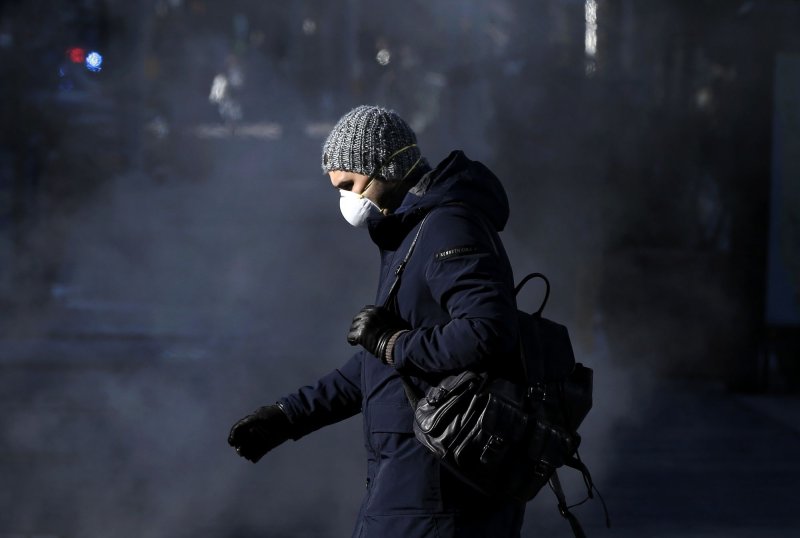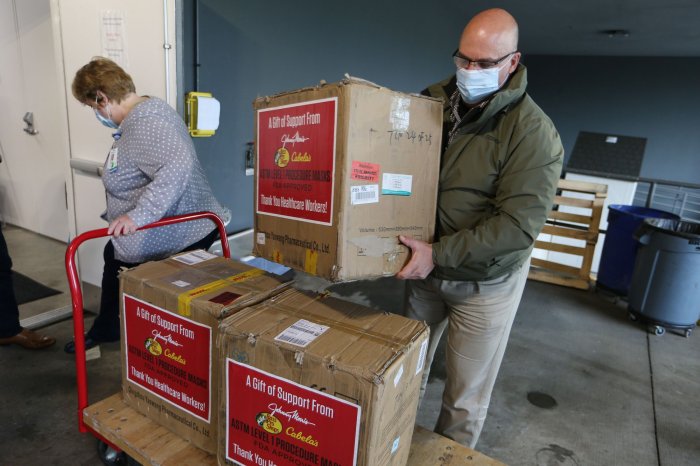1 of 4 | A pedestrian wears gloves and a protective mask near Lincoln Center in New York City on March 24. Photo by John Angelillo/UPI |
License Photo
March 25 (UPI) -- Coronavirus cases continued to spike in New York, Gov. Andrew Cuomo said Wednesday, with 5,000 new infections in the previous 24 hours to bring the state's total to more than 30,000.
Some 3,000 of the new cases were in New York City, where the total of COVID-19 cases rose to more than 17,000.
New York has become the epicenter of the coronavirus outbreak in the United States, with more than 200 deaths. Cases in New York City alone have been doubling every three days and now account for more than half of the U.S. total.
"We're still on the way up the mountain," Cuomo said, referring to the upward trajectory of the positive case and death rates.
He repeated his estimate that 140,000 New Yorkers will eventually be hospitalized with the coronavirus over the next 14 to 21 days. More than 3,800 people have already been hospitalized.
The governor also announced he had issued orders closing New York City parks and playgrounds to counter a trend of crowds gathering there while the city is on lockdown. To provide residents with safer options for exercise and being outdoors, he said he was in negotiations with the city to close certain streets to car traffic.
"People want to walk. They want to go out and get some air. You want a less dense area, so [we'll] pilot closing streets to cars, opening streets to pedestrians," Cuomo said.
Addressing a pending $2 trillion economic stimulus bill pending before Congress, Cuomo said the amount going to New York was a "drop in the bucket" compared to the massive need created by the pandemic.
The plan now under consideration by the U.S. Senate would send $3.8 billion to the state and less than $2 billion to the city, while under a House version, the state would get $17 billion.
Although $3.8 billion "sounds like a lot of money," Cuomo said, "we're looking at a revenue shortfall of $9 billion, $10 billion, $15 billion. This response to this virus has probably already cost us $1 billion."
The city began reducing subway service on Wednesday as a result of falling demand and some worker shortages brought on by the outbreak, with reductions in bus and commuter rail service coming later this week.
The Metropolitan Transportation Authority said Wednesday marked the start of its "essential service plan," which substantially cuts service across all three platforms.
"This preserves our a.m. and p.m. peak service for essential workers while helping reduce density for our staff and riders," the agency said. "If you can stay home, please do."
Sarah Feinberg, the MTA's head of subway and bus systems, said staff shortages on Tuesday caused delays for more 800 subway trains. The agency suspended service on three of its 27 subway lines and switched other services to local from express.
The MTA said trains were running at just 75 percent of regular service. A similar reduction in bus service will start Thursday, and commuter rail on Friday. Fifty-two MTA workers have so far tested positive for COVID-19, officials said.
Officials said subway ridership has fallen by 87 percent amid lockdown orders, compared to this time last year.
"It's a struggle but we're providing the service that New York needs right now," transport workers union president Tony Utano said Tuesday. "Some of our members have tested positive, some have called in sick and some were quarantined by the MTA as a precaution because they may have come in contact with someone who has the virus."
Many healthcare and other essential workers rely on subways and buses to reach their jobs. MTA officials have urged other civilians to stay away from mass transit, but also warned the system could lose billions due to the reduced ridership.
Senate Democratic leader Chuck Schumer said the coronavirus rescue package contains financial aid for city transit systems across the United States.
Some $3.8 billion is earmarked exclusively for the MTA.
Bass Pro Shops marketing manager David Smith (R) carries a box of donated face masks into Mercy Health in Chesterfield, Mo., on May 13. The company is donating 1 million FDA-approved ASTM Level 1 Procedure Face Masks to healthcare workers and first responders working on the front lines of the pandemic. Photo by Bill Greenblatt/UPI |
License Photo
















